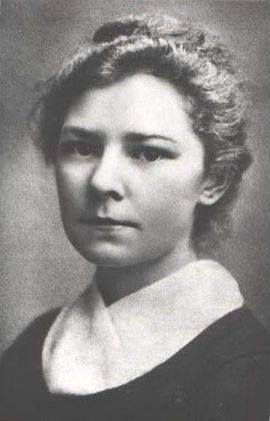Ethel Lilian Voynich (1864-1960)
Life
| [née Ethel Lilian Boole]; b. and brought up in Cork, dg. George Boole (1815-64), of Boolean mathematics fame, and Mary Everest Boole, a feminist writer; self-taught scholar from Yorkshire and Professor of Maths Queen’s College, Cork (UCC); neice of Himalayas explorer Everest; ed. in Ireland and Berlin; knew Wilde and Shaw in London; travelled in Russia; m. in 1891 Count Wilfrid Mikhail Voynich (1865-1930), an escapee from Siberia, who introduced her to revolutionary European politics and claimed to have seen her previously standing outside Warsaw Citadel where he was held; worked for Free Russia; had affair with Sydney Reilly, a British spy (orig. Sigmund Rosenblum); issued Stories from Garshin (1893); |
published The Gadfly (1897), a highly romantic yet realistic treatment of risorgimento period in Italy concerning the activities of the international republican agent Arthur Burton who successfully eludes the Austro-Hungarian policy and contributes to the revolutionary cause culminating in the Italian uprising of 1848; sold 2,500,000 copies world-wide and an additional 5 million in Russian; issued a sequel, An Interrupted Friendship (1910); gave up writing for music in 1911 but returned to the theme with Put Off Thy Shoes (1945), concerning her heroine’s early life in Cornwall; other works incl. An Interrupted Friendship, Olive Latham, Frank Raymond; ed. Russian Wit and Humour, an anthology of pre-Revolutionary Russia; she encouraged young writers incl. Ivor Gurney who stayed with her in Cornwall; lived mostly in New York after 1916; Put Off Thy Shoes was her last book. NCBE DIW OCEL SUTH APPL |
Ethel Boole Voynich (1864-1960) |
[ top ]
Works
The Gadfly (London: Heinemann 1897); P. J. Kavanagh, ed., Letters,
ed. (OUP 1982); [?] Thornton Selected Letters (Carcanet 1990) [BL
7].
[ top ]
Criticism
Arnold Kettle, ‘E. L. Voynich: Forgotten English Novelist’, in Essays in Criticism, 7 (1957); see also Robin N. Bruce Lockhart, Ace of Spies (London: Hodder & Stoughton 1967) and Elaine Showalter, A Literature of their Own (1984).
See also R. M. Fox, ‘A Forgotten Irish Writer’, in The Irish Times (27 April 1966), p.10; rep. in Irish Times (6 June 2009), archival suppl. [‘E. L. Voynich had the determined melancholy of the Yellow Book period and writes with the poignancy of youth’].
[ top ]
Notes
George Boole (1815-64), b. Lincoln; self-taught in French, German and Italian; had own school in Lincoln at 20; appt. first Prof. in Mathematics, Royal University, Cork, aetat. 34; wrote The Laws of Thought (1854); considered by Bertrand Russell to be the founder of Pure Mathematics; the science library at Cork University (UCC) is named after him.
Bruce Harkness, Conrad’s The Secret Agent: Texts and Contexts’, Journal of the Joseph Conrad Society, 4:3 (Feb. 1979), pp.2-11, relates that Joseph Conrad wrote to Edward Garnett of The Gadfly, ‘I don’t remember reading a novel I disliked so much.’ (Letter of 11 Oct. 1896). [See further discussion, infra.]
Bruce Harkness writes in response to discussion of Irish references in Conrad: ‘Concerning possible sources of Vladimir in The Secret Agent, I had written to E. L. Voynich and she kindly replied from New York where she was the living, February 14, 1958, and I quoted her at some length in my talk and give a tiny bit here. [She replied:] ‘I have jut reread ‘The Secret Agent’ to refresh my memory of it [said Mrs. Voynich]. After my novel The Gadfly had been published by Heinemann in 1897 I was informed by Mr. Pawling of that firm that Conrad had expressed the wish to meet me. (The Nigger of the Narcissus had been published by Heinemann in the same year.) I responded very warmly because I so much admired his work (I still admire it greatly). Some time later Mr. Pawling found himself in the embarrassing position of having to tell me that Conrad had decided he did not like The Gadfly and therefore was no longer interested in meeting me. / Curiously enough, this distressing experience was suddenly recalled to my mind about two years ago when a writer friend told me, as a rather amusing detail, that in the course of her researches on the 1890”s in England she had just come across a statement Conrad had made about ‘The Gadfly’: '”a very bad book; I read it four times.” Just where this reference occurs I [E. L. Voynich] do not know.’ Harkness confesses he doesn’t know either, but reflects on the amazing popularity of the novel. [ModBrits E-List, 22 Sept. 1996.]
G. B. Shaw produced a dramatised version of The Gadfly in 1898, according to Richard J. Finneran in Anglo-Irish Literature: A Review of Research (1976). There is a Russian film with a musical score by Dmitri Shostokovich [BBC3].
[ top ]
